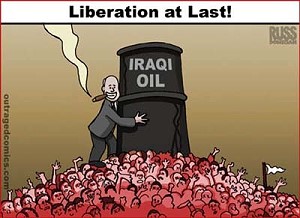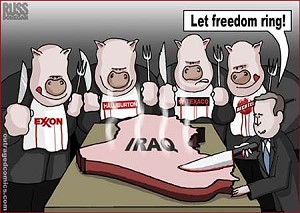
The Coalition of the Gobbling has now set the scene for massive exploitation by its vampirish associates of Iraq’s oil without so much as a murmur from the Iraqi puppet government.
The law is set to be approved in March.
On Monday, Prime Minister Nuri al-Maliki’s cabinet in Baghdad approved the draft of the new Iraqi oil law. The government regards it as “a major national project”. The key point of the law is that Iraq’s immense oil wealth (115 billion barrels of proven reserves, third in the world after Saudi Arabia and Iran) will be under the iron rule of a fuzzy “Federal Oil and Gas Council” boasting “a panel of oil experts from inside and outside Iraq”. That is, nothing less than predominantly US Big Oil executives.
The law represents no less than institutionalized raping and pillaging of Iraq’s oil wealth. It represents the death knell of nationalized (from 1972 to 1975) Iraqi resources, now replaced by production sharing agreements (PSAs) – which translate into savage privatization and monster profit rates of up to 75% for (basically US) Big Oil. Sixty-five of Iraq’s roughly 80 oilfields already known will be offered for Big Oil to exploit. As if this were not enough, the law reduces in practice the role of Baghdad to a minimum. Oil wealth, in theory, will be distributed directly to Kurds in the north, Shi’ites in the south and Sunnis in the center. For all practical purposes, Iraq will be partitioned into three statelets. Most of the country’s reserves are in the Shi’ite-dominated south, while the Kurdish north holds the best prospects for future drilling.

The approval of the draft law by the fractious 275-member Iraqi Parliament, in March, will be a mere formality. Hussain al-Shahristani, Iraq’s oil minister, is beaming. So is dodgy Barnham Salih: a Kurd, committed cheerleader of the US invasion and occupation, then deputy prime minister, big PSA fan, and head of a committee that was debating the law.
But there was not much to be debated. The law was in essence drafted, behind locked doors, by a US consulting firm hired by the Bush administration and then carefully retouched by Big Oil, the International Monetary Fund, former US deputy defense secretary Paul Wolfowitz’ World Bank, and the United States Agency for International Development. It’s virtually a US law (its original language is English, not Arabic).
Scandalously, Iraqi public opinion had absolute no knowledge of it – not to mention the overwhelming majority of Parliament members. Were this to be a truly representative Iraqi government, any change to the legislation concerning the highly sensitive question of oil wealth would have to be approved by a popular referendum.
In real life, Iraq’s vital national interests are in the hands of a small bunch of highly impressionable (or downright corrupt) technocrats. Ministries are no more than political party feuds; the national interest is never considered, only private, ethnic and sectarian interests. Corruption and theft are endemic. Big Oil will profit handsomely – and long-term, 30 years minimum, with fabulous rates of return – from a former developing-world stalwart methodically devastated into failed-state status.
Once the insurgents, guerillas and Iraqi public become aware of the impending oil rape by the Coalition of the Gobbling, it is quite possible that there will be a strategic unification and uprising against the common colonialist enemy which no Doodoo surge will be able to suppress.






It’s STILL the oil: Secret Condi Meeting on Oil Before Invasion
by Greg Palast
Sunday, March 18, 2007
Four years ago this week, the tanks rolled for what President Bush originally called, ” Operation Iraqi Liberation” — O.I.L.
I kid you not.
And it was four years ago that, from the White House, George Bush, declaring war, said, “I want to talk to the Iraqi people.” That Dick Cheney didn’t tell Bush that Iraqis speak Arabic … well, never mind. I expected the President to say something like, “Our troops are coming to liberate you, so don’t shoot them.” Instead, Mr. Bush told, the Iraqis,
“Do not destroy oil wells.”
Nevertheless, the Bush Administration said the war had nothing to do with Iraq’s oil. Indeed, in 2002, the State Department stated, and its official newsletter, the Washington Post, repeated, that State’s Iraq study group, “does not have oil on its list of issues.”
But now, we’ve learned that, despite protestations to the contrary, Condoleezza Rice held a secret meeting with the former Secretary-General of OPEC, Fadhil Chalabi, an Iraqi, and offered Chalabi the job of Oil Minister for Iraq. (It is well established that the President of the United States may appoint the cabinet ministers of another nation if that appointment is confirmed by the 101st Airborne.)
In all the chest-beating about how the war did badly, no one seems to remember how the war did very, very well — for Big Oil.
The war has kept Iraq’s oil production to 2.1 million barrels a day from pre-war, pre-embargo production of over 4 million barrels. In the oil game, that’s a lot to lose. In fact, the loss of Iraq’s 2 million barrels a day is equal to the entire planet’s reserve production capacity.
In other words, the war has caused a hell of a supply squeeze — and Big Oil just loves it. Oil today is $57 a barrel versus the $18 a barrel price under Bill “Love-Not-War” Clinton.
Since the launch of Operation Iraqi Liberation, Halliburton stock has tripled to $64 a share — not, as some believe, because of those Iraq reconstruction contracts — peanuts for Halliburton. Cheney’s former company’s main business is “oil services.” And, as one oilman complained to me, Cheney’s former company has captured a big hunk of the rise in oil prices by jacking up the charges for Halliburton drilling and piping equipment.
But before we shed tears for Big Oil’s having to hand Halliburton its slice, let me note that the value of the reserves of the five biggest oil companies more than doubled during the war to $2.36 trillion.
And that was the plan: putting a new floor under the price of oil. I’ve have that in writing. In 2005, after a two-year battle with the State and Defense Departments, they released to my team at BBC Newsnight the “Options for a Sustainable Iraqi Oil Industry.” Now, you might think our government shouldn’t be writing a plan for another nation’s oil. Well, our government didn’t write it, despite the State Department seal on the cover. In fact, we discovered that the 323-page plan was drafted in Houston by oil industry executives and consultants.
The suspicion is that Bush went to war to get Iraq’s oil. That’s not true. The document, and secret recordings of those in on the scheme, made it clear that the Administration wanted to make certain America did not get the oil. In other words, keep the lid on Iraq’s oil production — and thereby keep the price of oil high.
Of course, the language was far more subtle than, “Let’s cut Iraq’s oil production and jack up prices.” Rather, the report uses industry jargon and euphemisms which require Iraq to remain an obedient member of the OPEC cartel and stick to the oil-production limits — “quotas” — which keep up oil prices.
The Houston plan, enforced by an army of occupation, would, “enhance [Iraq’s] relationship with OPEC,” the oil cartel.
And that’s undoubtedly why Condoleezza Rice asked Fadhil Chalabi to take charge of Iraq’s Oil Ministry. As former chief operating officer of OPEC, the oil cartel, Fadhil was a Big Oil favorite, certain to ensure that Iraq would never again allow the world to slip back to the Clinton era of low prices and low profits. (In investigating for BBC, I was told by the former chief of the CIA’s oil unit that he’d met with Fadhil regarding oil at Bush’s request. Fadhil recently complained to the BBC. He denied the meeting with the Bush emissary in London because, he noted, he was secretly meeting that week in Washington with Condi!)
Fadhil, by the way, turned down Condi’s offer to run Iraq’s Oil Ministry. Ultimately, Iraq’s Oil Ministry was given to Fadhil’s fellow tribesman, Ahmad Chalabi, a convicted bank swindler and neo-con idol. But whichever Chalabi is nominal head of Iraq’s oil industry in Baghdad, the orders come from Houston. Indeed, the oil law adopted by Iraq’s shaky government this month is virtually a photocopy of the “Options” plan first conceived in Texas long before Iraq was “liberated.”
In other words, the war has gone exactly to plan — the Houston plan. So forget the naïve cloth-rending about a conflict gone haywire. Exxon-Mobil reported a record $10 billion profit last quarter, the largest of any corporation in history. Mission Accomplished.